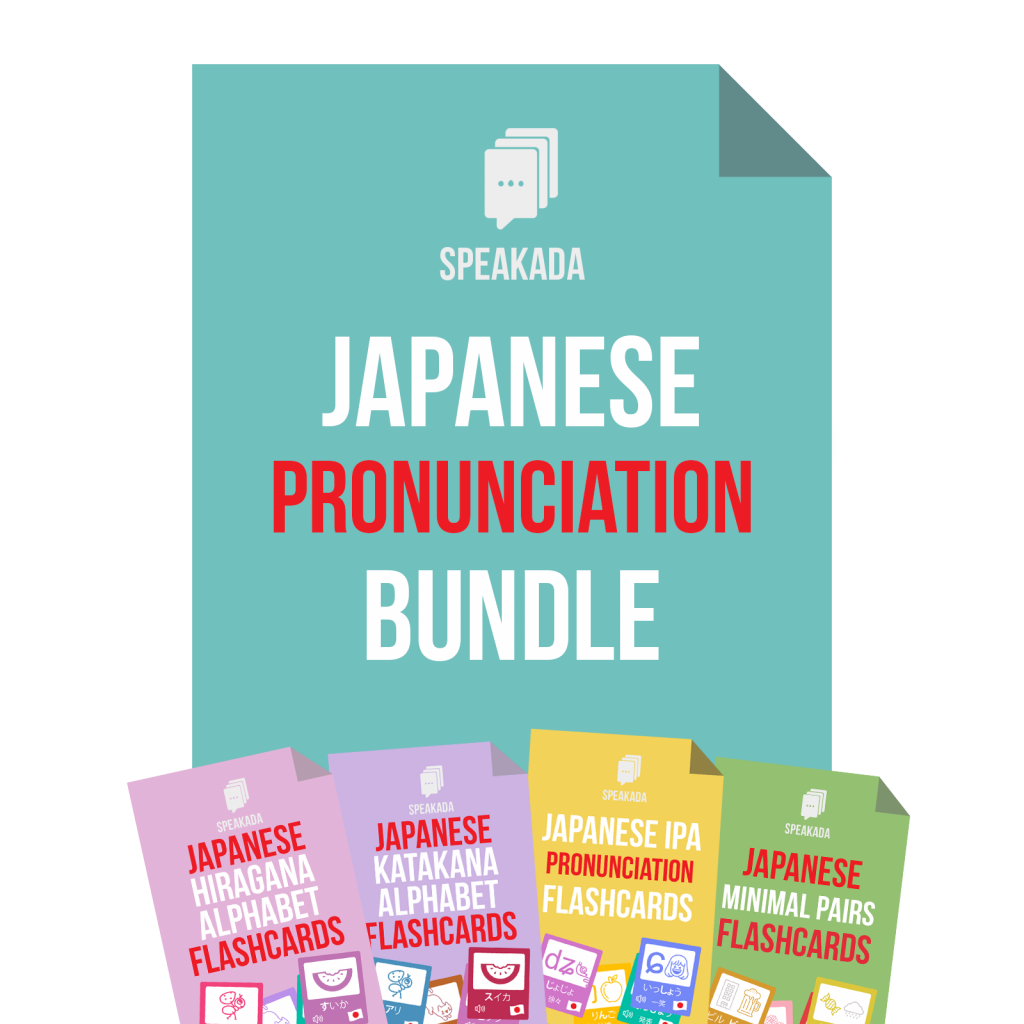
WHAT IS THE JAPANESE PRONUNCIATION BUNDLE?
The Japanese pronunciation bundle is a set of the essential Anki flashcards to learn Japanese pronunciation. It is made for Japanese learners at the beginners level who would like to learn and memorize Japanese pronunciation within 1-2 months. Even intermediate and advanced Japanese learners will find this useful, especially if you still have Japanese pronunciation problems. With this digital flashcard bundle, you’ll learn the Japanese alphabet (Hiragana and Katakana), Japanese IPA pronunciation and Japanese minimal pairs.
Receive a discount by buying all 4 flashcard decks now.
WHY SHOULD I LEARN JAPANESE PRONUNCIATION?
Sounds of Japanese are the Foundations of the Language
If we breakdown the Japanese language and examine what makes up a language, we can see that Japanese conversations are made up of sentences. Then, each sentence is made up of words. But each Japanese word is made up of unique Japanese sounds. These Japanese are the foundations of the Japanese language.
The sounds of Japanese are different to your native language. Some of the Japanese sounds aren’t used very often in the English language for example, such as the rolled R sound. The way we would pronounce letters from the alphabet are also different in English compared to Japanese. In order to begin learning Japanese and the sounds of Japanese, we need to learn Japanese pronunciation.
Learn Japanese Pronunciation to Avoid Permanent Errors in Speaking
If you speak with terrible Japanese pronunciation to a native Japanese speaker, they may not understand you, even though your Japanese vocab and grammar are perfect. We want to make sure that you get the foundations of Japanese handled right from the beginning because it might be very difficult to change your accent later on.
Language experts call this phenomenon “fossilization”. It’s when language learners make permanent errors in the way they speak a foreign language because they constantly use language features of their native language. If you skip learning pronunciation, you’ll most likely create bad habits, which can prevent you from being able to communicate in Japanese.
Self-correction and Boost of Confidence
If you have terrible pronunciation, then you’re more likely to face situations where you are misunderstood and confused. When this happens, you might feel embarrassed and frustrated because you’re unable to communicate properly and this hinders your ability to learn Japanese.
It would be impossible to have a Japanese tutor follow you everywhere and correct your pronunciation in all situations. So we recommend that the best solution to your poor pronunciation is to improve your ability to self-correct yourself. In this way, you will be able to catch yourself making pronunciation mistakes, and then correct yourself before miscommunication occurs. The Japanese Pronunciation Flashcards Bundle helps you remember all of the important sounds of Japanese so that you can self-correct your pronunciation in any situation.
When you improve your Japanese pronunciation, you also get the added bonus of improving your confidence and motivation to learn Japanese, and research studies have shown this to be true. By self-correcting your own pronunciation difficulties, it will help improve your listening comprehension and give you confidence to speak in Japanese. Your Japanese pronunciation can enhance your fluency and native speakers will understand you better.
HOW DO I LEARN JAPANESE PRONUNCIATION?
Japanese pronunciation can be broken down into 3 parts; Japanese alphabet (Hiragana and Katakana), Japanese IPA and Japanese minimal pairs. All 3 parts will help to improve your Japanese pronunciation in different but essential ways.
1. Japanese Alphabet (Hiragana and Katakana)
In order to improve your pronunciation, the Japanese alphabet, including both Hiragana and Katakana, is the first step because the alphabet is used to write out Japanese words and represent Japanese sounds. Native Japanese speakers use this alphabet to write words and sentences, so it makes sense when learning Japanese to start with the Japanese Hiragana and Katakana alphabets.
Japanese letters or characters look totally different from the English alphabet. Not only that, the Japanese name of the letters and its use in Japanese words are very different from English. Again, we want to familiarize ourselves with the Japanese sounds in order to avoid “fossilization” from occurring and affecting your speech.
By learning the Japanese Hiragana and Katakana alphabets, you’ll also expose yourself to some words that start with those letters. This can help you associate how those letters sound in actual Japanese words.
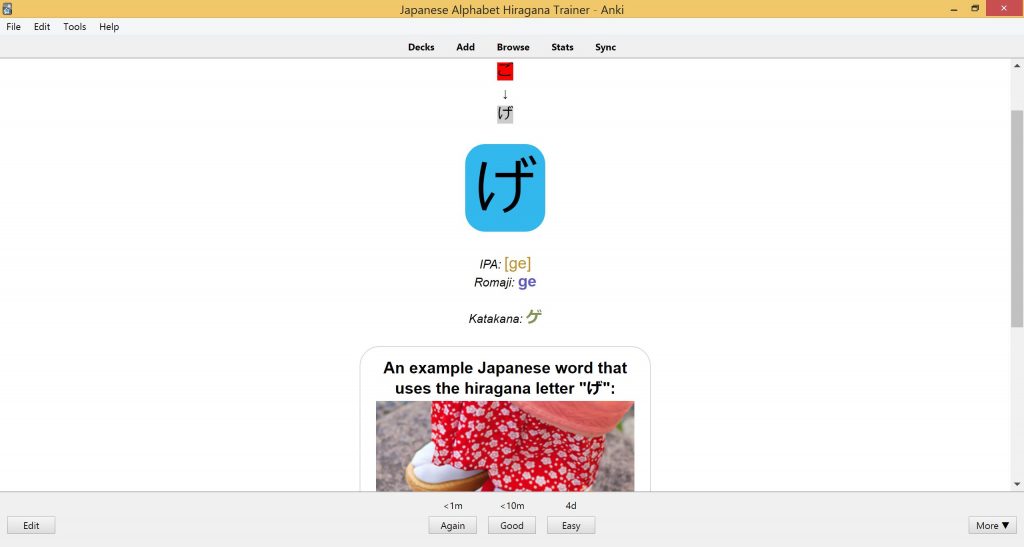
2. Japanese IPA
The Japanese IPA (Japanese International Phonetic Alphabet) is a standardized representation of the sounds of spoken language. The IPA is useful because the IPA of a word tells you how to pronounce it correctly in Japanese in a standardized way.
The regular Japanese alphabet is different from the Japanese IPA. Take the example of the Japanese word “雰囲気”, which means “mood”. If you read this Japanese word as it’s spelled in regular Japanese letters, then you may not pronounce it correctly.
As a native English speaker, you may not know how to pronounce it properly at all, and a Japanese speaker will be totally confused. You’ll feel embarrassed and not get your point across. But, if you read the IPA of “雰囲気”, you’ll find it spelled like this ” [ɸɯ̟̃ᵝɰ̃ikʲi] “.
By learning the Japanese IPA you’ll be able to pronounce sounds in Japanese from the written IPA. In time, you’ll be able to see the IPA symbols and know how the word should be pronounced correctly.
3. Japanese Minimal Pairs
Minimal pairs are 2 words that seem very similar when you hear them, except for just 1 sound. In Japanese, there are minimal pairs such as “来た” and “切った”, which mean “came” and “cut” respectively.
These subtle differences in sound can make all the difference when you are trying to understand or speak Japanese.
Learning the Japanese minimal pairs can improve your pronunciation skills as well as your listening comprehension. This is proven by academic research.
Ann Bradlow from Cornell University and colleagues did academic research that found that minimal pair training results in improved pronunciation. Language learners of English improved their ability to discriminate between the /r/ and /l/ sounds to around 82 percent accuracy from 65 percent from a training period of 15-22 hours over 3 weeks.
In a recent study published in 2020, academic researchers from UCAM University did minimal pair testing in Spain. The researchers studied 52 language learners, focused on minimal pair words that compared sounds like /æ/ , /ɑː/ , /ʌ/ , and /ə/, as well as comparing the /s/ and /z/ sounds. They concluded that minimal pair training fostered substantial improvements in the learners’ perception and production of the target sounds.
Japanese minimal pairs are important as there is strong academic evidence that shows that it can improve your Japanese pronunciation. Also, if you can distinguish between the different Japanese sounds, you’ll be able to understand Japanese native speakers better and you’ll enunciate words clearer.
WHAT IS INCLUDED IN THE JAPANESE PRONUNCIATION BUNDLE?
The Anki Japanese pronunciation flashcards bundle includes all 4 digital flashcard decks for Anki you’ll need to learn Japanese pronunciation. The 4 flashcard decks included are:
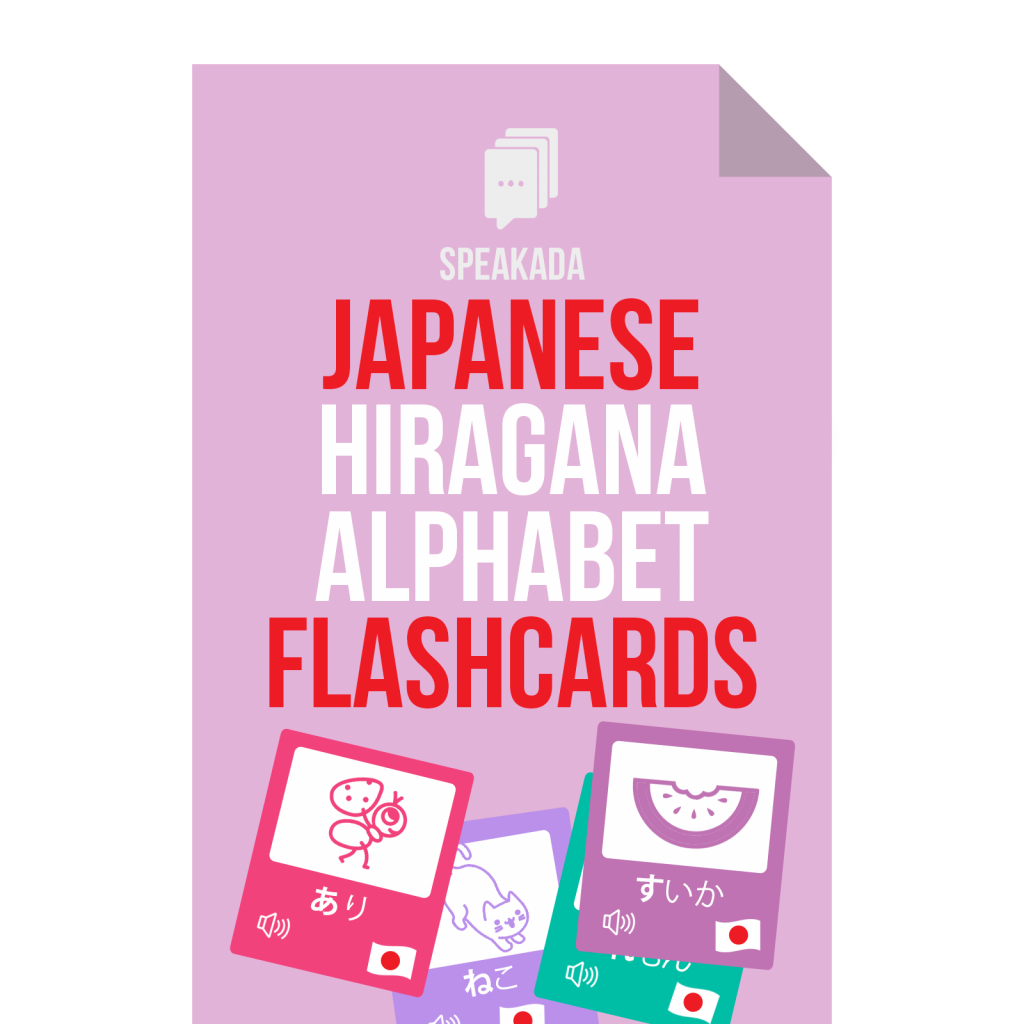
Learn the Japanese Hiragana alphabet with pictures and audio. Get familiar with the sounds & letters of the Japanese language.
Learn More
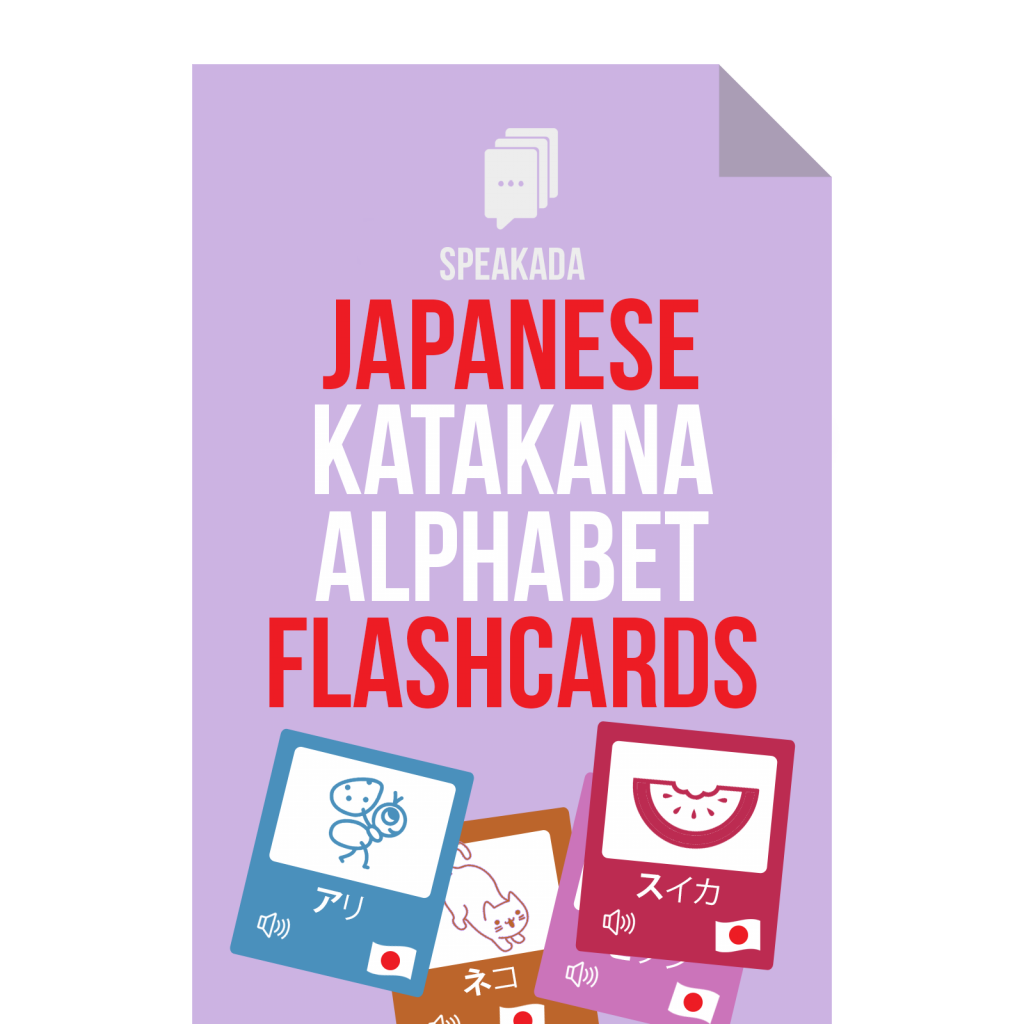
Learn the Japanese Katakana alphabet with pictures and audio. Get familiar with the sounds & letters of the Japanese language.
Learn More
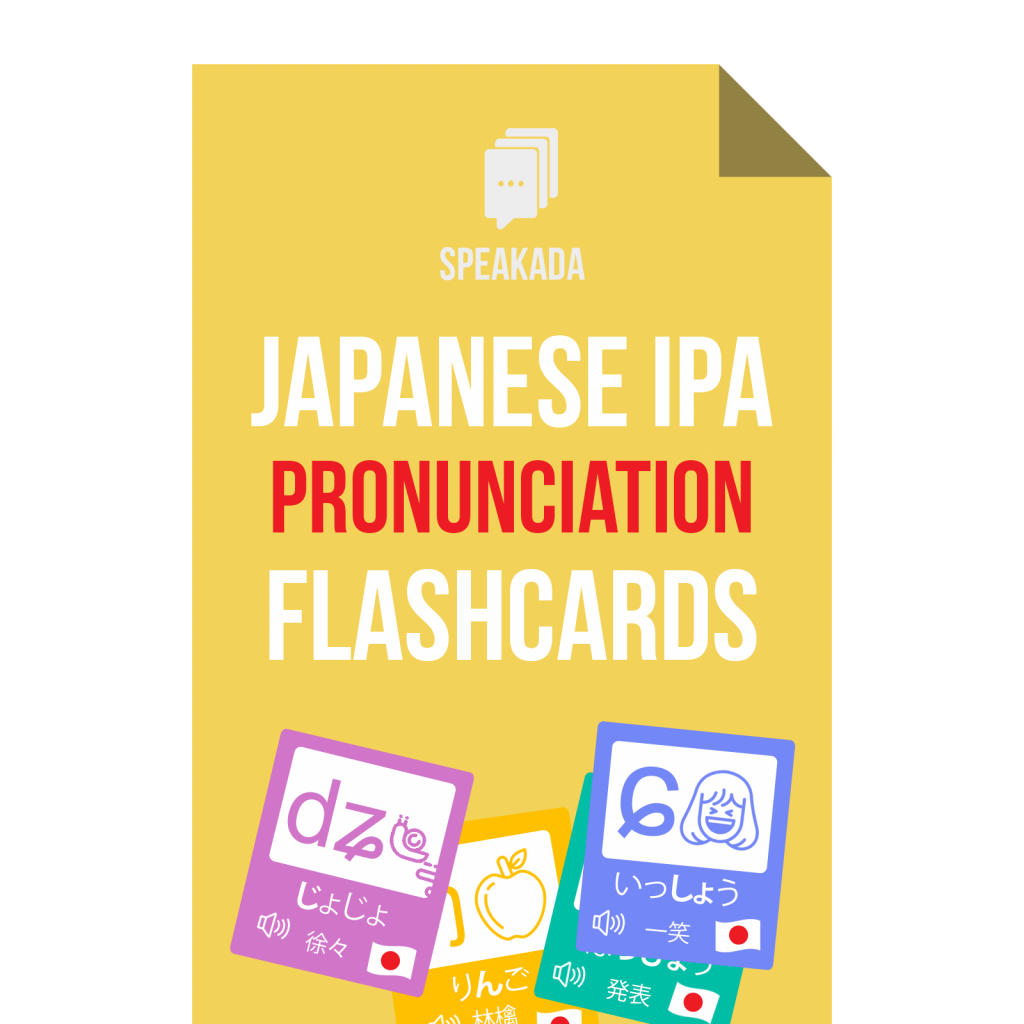
Learn the fundamentals in Japanese pronunciation using the Japanese IPA Anki flashcards.
Learn More
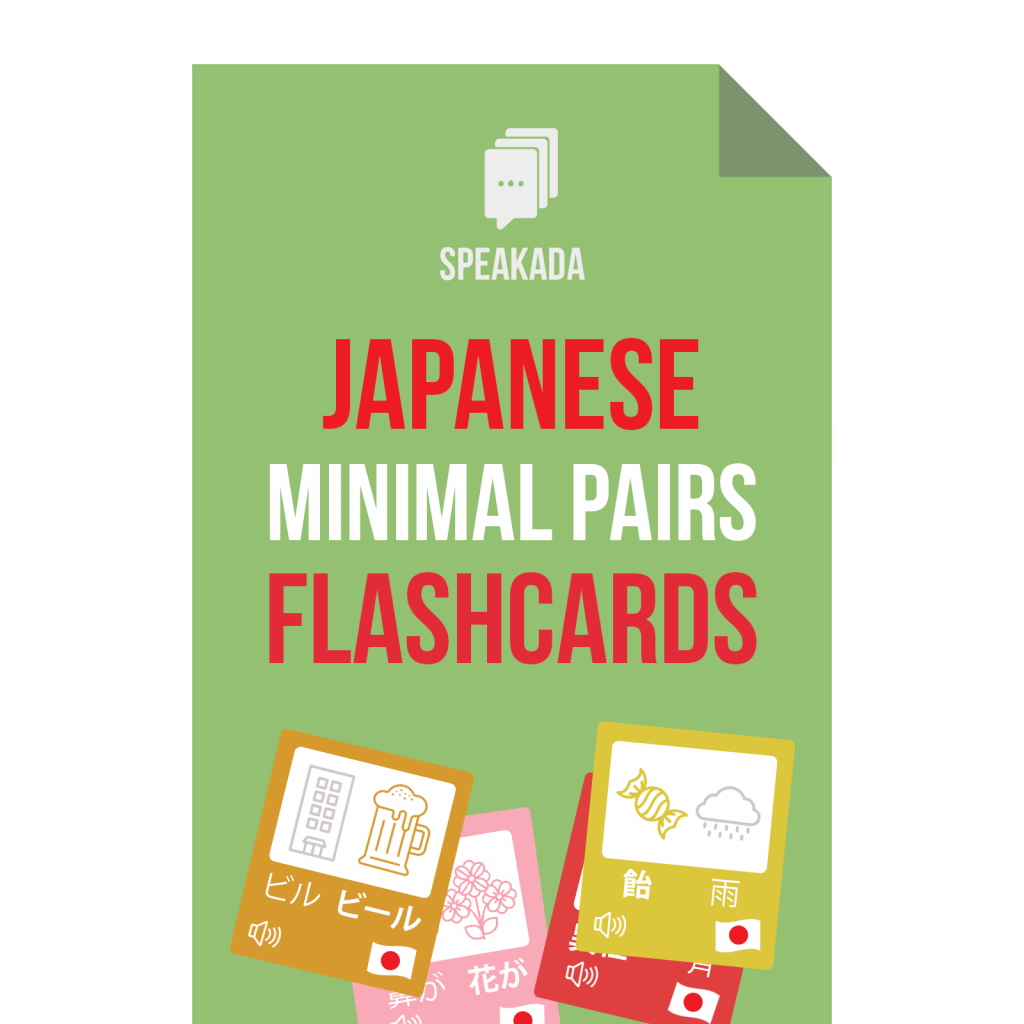
Learn the most common Japanese minimal pairs to improve your Japanese pronunciation.
Learn More
TESTIMONIALS
Hear from the hundreds of language learners who use our Anki decks and love them!
“Speakada uses diverse methods of teaching and learning, from visual to vocal, which all makes it easy to learn.”

(International trade diplomat & Language learner)
“I’ve been able to tweak my pronunciation, reducing the mistakes I make & increasing my memory of new words.”

(Corporate Tax Specialist & Language learner)
“Speakada motivates me by adapting to my schedule. I can learn in my own time. Now language learning is more fun.”

(Emergency medical doctor & Language learner)
“Thanks to Speakada I was able to save hours making flashcards and instead, focus on learning with confidence.”

(Business lawyer & Language learner)
YOUR PURCHASE IS SAFE

Your purchase is safe. All credit card information is processed on a secure server by a trusted payment service provider, such as Stripe. If you buy and receive our product, but it is significantly different from our original description on our website, then simply email us within 7 days to request a refund.
